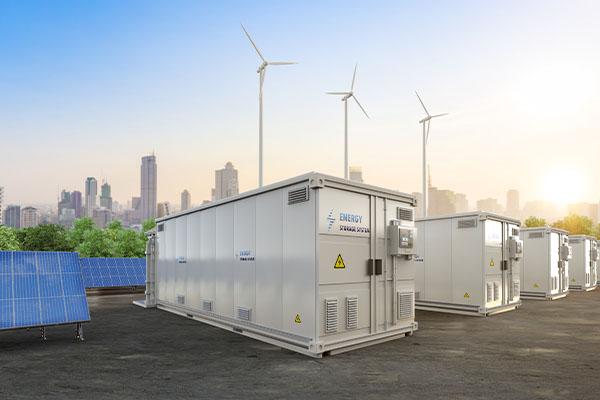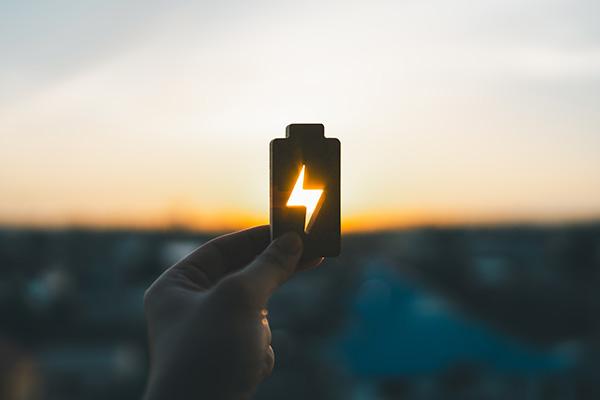Battery Energy Storage Systems in California
Battery energy storage systems (BESS) have become a vital component in California to maintain electrical grid reliability, avoiding blackouts during peak demand hours in the summer months, and capturing and storing excess renewable energy generation from sources such as wind and solar for later use when it is needed the most. As BESS projects continue to grow in California, safety remains a top priority for the state.

State Battery Storage Collaborative
Governor Gavin Newsom convened a State Battery Storage Collaborative to examine BESS technology types, safety considerations, and pathways for increased collaboration between the state, local permitting authorities, first responders, industry, and communities.

CEC Map of BESS Resources
From 2018 to 2024, battery storage capacity in California increased from 500 megawatts (MW) to more than 13,300 MW. The state projects 52,000 MW of battery storage will be needed by 2045. The California Energy Commission manages the California Energy Storage Survey, a dashboard showing statewide data for residential, commercial and utility-scale BESS facilities.
Resources and FAQs
What is a battery energy storage system (BESS)?
A battery energy storage system (BESS) is a type of energy infrastructure that plays a critical role to support the function of the California electrical grid. Many large-scale BESS projects are connected to the grid through utilities and can either be paired with an energy generation source, such as solar or wind, or be standalone facilities. BESS resources charge up during the day when renewable sources of energy are plentiful and discharged later in the day when households and businesses increase their energy usage. The ability to save energy for later use becomes a critical public health necessity in the summer months in California when heatwaves cause users to dramatically increase usage of electricity for cooling purposes. BESS allows the state to avoid catastrophic blackouts and maintain grid operations, reliability, and safety.
What are codes and standards for BESS?
CPUC BESS Standards
The California Public Utilities Commission (CPUC) issued new standards and enhanced oversight of battery energy storage facilities in early 2025 to increase BESS safety as battery technology continues to evolve:
CPUC Issues Proposal to Enhance Safety of Battery Energy Storage Facilities – January 2025 Press Release
CPUC Sets New Safety Standards and Enhances Oversight of Emergency Plans for Battery Energy Storage Facilities – March 2025 Press Release
OSFM – Fire Codes Update
The California Office of the State Fire Marshal (OSFM) is undergoing an update to the state fire code that will provide updates to BESS standards. The update will be linked below once it is released.
OSFM Battery Energy Storage Systems
UL 9540
The UL 9540 standard covers BESS testing and certification:
UL Solutions Energy Storage System Testing and Certification
NFPA
The NFPA standard addresses the installation of BESS projects:
NFPA Energy Storage Systems (ESS) and Solar Safety
ACP BESS Standards Overview
American Clean Power (ACP) compiled and overview of BESS standards in the U.S.:
ACP U.S. Codes and Standards for Battery Energy Storage Systems
Where can I find information about BESS safety webinars and events?
OSFM BESS Fire Safety Symposium
The California Office of the State Fire Marshal (OSFM) will be hosting a BESS Fire Safety Symposium on July 24th to share valuable insights on improving emergency response, latest research and technology, understanding codes and standards, and updates on state initiatives to local fire departments and officials. More information can be found here:
OSFM BESS Fire Safety Symposium
GO-Biz BESS Safety & Permitting Initiative Webinar
In March 2025, GO-Biz held a webinar to discuss Battery Energy Storage System (BESS) Permitting. To access the webinar recording and materials, click below:
BESS Safety Webinar Recording
Presentation Slides & Flyer
Speaker Bios
CEC BESS Safety Webinar & Docket
The California Energy Commission (CEC) opened a docket log on BESS following a BESS Safety Webinar in February of 2024. The webinar recording and docket log can be found below:
Where can I find more information about BESS?
More information on BESS can be found from the following resources:
- California Office of State Fire Marshal (OSFM) Energy Storage Systems
- S. Energy Information Administration (EIA) – Energy storage for electricity generation
- California Independent System Operator (CAISO) – Storage
- California Public Utilities Commission – Energy Storage
- Pacific Northwest National Lab – Battery Energy Storage Systems Are Here: Is Your Community Ready?
- NY Best – Battery Energy Storage Systems Safety and Best Practices Resource Library
- Lumen Energy Strategy – Energy Storage
- Clean Energy States Alliance – Battery Storage 101
Where can I find information about Long Duration Energy Storage (LDES)?
Long-duration energy storage (LDES) is a technology that can store large amounts of energy for an extended period of time and provide critical reliability to the electrical grid. The U.S. Department of Energy classifies LDES as systems capable of storing energy for 10 hours or longer and can come in a variety of technology types, including pumped hydro, lithium-ion, sodium-ion, iron air, solid state, hydrogen, and more.
- California Energy Commission – Assessing the Value of Long-Duration Energy Storage in CA
- National Renewable Energy Laboratory – Storage Futures Study
- Environmental Defense Fund – California needs clean firm power, and so does the rest of the world
- Energy Innovation – Illustrative Pathways to 200 Percent Zero Carbon Power by 2035 without Increasing Customer Costs
- McKinsey – Net-zero power: Long-duration energy storage for a renewable grid
- California Energy Commission – Long Duration Energy Storage Systems Webinar Series
- Sandia National Laboratories – Introduction to Long Duration Energy Storage
- Decarbonization Channel – All Commercially Available Long Duration Energy Storage Technologies, in One Chart











